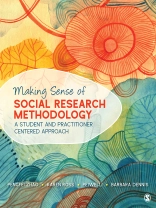Making Sense of Social Research Methodology: A Student and Practitioner Centered Approach introduces students to research methods by illuminating the underlying assumptions of social science inquiry. Authors Pengfei Zhao, Karen Ross, Peiwei Li, and Barbara Dennis show how research concepts are often an integral part of everyday life through illustrative common scenarios, like looking for a recipe or going on a job interview. The authors extrapolate from these personal but ubiquitous experiences to further explain concepts, like gathering data or social context, so students develop a deeper understanding of research and its applications outside of the classroom. Students from across the social sciences can take this new understanding into their own research, their professional lives, and their personal lives with a new sense of relevancy and urgency.
This text is organized into clusters that center on major topics in social science research. The first cluster introduces concepts that are fundamental to all aspects and steps of the research process. These concepts include relationality, identity, ethics, epistemology, validity, and the sociopolitical context within which research occurs. The second and third clusters focus on data and inference. These clusters engage concretely with steps of the research process, including decisions about designing research, generating data, making inferences. Throughout the chapters, Pause and Reflect open-ended questions provide readers with the space for further inquiry into research concepts and how they apply to life. Research Scenario features in each chapter offer new perspectives on major research topics from leading and emerging voices in methods. Moving from this dialogic perspective to more actionable advice, You and Research features offer students concrete steps for engaging with research. Take your research into the world with Making Sense of Social Research Methodology: A Student and Practitioner Centered Approach.
Spis treści
Preface
About the Authors
Chapter 1: Our Research Story: A Prelude
Paths Toward Research
Making Implicit Explicit: Our Intentions and Assumptions
About Reading This Book
CLUSTER 1 • UNDERSTANDING RESEARCH: MAKING SENSE OF UNDERLYING ASSUMPTIONS
Roots and Branches
Chapter 2: How Do We Know? That Is the Question
Musing Upon the Everyday: Enquiring Minds Want to Know
Narrative and Conceptual Interludes: The Meaning of “Research”
Research Scenario: Researching Through Collective Values: The Feminist Research Collective
Synthesis: An Open Dialogue
Chapter 3: Research, Identity, and Relational Processes
Musing Upon the Everyday: The Presentation of Self
Research Scenario: A Collaborative Action Research Project
Synthesis: Points for Reflection
Chapter 4: Ethical Considerations Across the Spectrum of Research
Musing Upon the Everyday: What Would You Do?
Narratives and Conceptual Interludes: On Being Ethical in Research Practices
Research Scenario: Marginalia: Sara Mc Clelland
Synthesis: Points for Reflection
Chapter 5: Knowledge and Meaning in Research
Musing Upon the Everyday: Understanding Meaning
Narrative and Conceptual Interludes: Different Ways of Knowing
Research Scenario: My “Fat Girl Complex”
Synthesis: Points for Reflection
Chapter 6: Sociopolitical Conditions of Research
Musing Upon the Everyday
Narrative and Conceptual Interludes
Research Scenario: Making a Difference as a Researcher
Synthesis: Points for Reflection
Chapter 7: Validity in the Context of Research
Musing Upon the Everyday: Validity in (Mis)understanding
Narrative and Conceptual Interludes: Do We Really Know the Truth?
Research Scenario: Validity and Assessment: David Rutkowski
Synthesis: Points for Reflection
CLUSTER 2 • WHAT IS THE MEANING OF “DATA”?
Roadmap
Chapter 8: What Am I Looking For?
Revisiting Research and Identity in the Context of Data
Musing Upon the Everyday: Solving Problems That Matter to Us
Narrative and Conceptual Interludes: A Researcher and Their Organizing
Research Scenario: Studying a Rare Condition: Jenny Downs
Synthesis: Points for Reflection
Chapter 9: Defining Data
Musing Upon the Everyday: How Much Should I Pay for My First Home?
Narrative and Conceptual Interludes
Research Scenario: The Effects of Power on Ethnographic Research: Ke Li
Synthesis: Points for Reflection
Chapter 10: Generating and Acquiring Data
Musing Upon the Everyday: How Should I Make That Lasagna?
Narrative and Conceptual Interludes: A Day in the Life of a Researcher
Research Scenario: Making Choices About Data Generation
Synthesis: Points for Reflection
Chapter 11: How Do I Know I Have “Enough” Data? How Do I Know I Have “Good” Data?
Musing Upon the Everyday: How Did the Lasagna Turn Out?
Narrative and Conceptual Interludes: Creating the Perfect Recipe
Research Scenario: Evaluating the Data Generation and Acquisition Process
Synthesis: Points for Reflection
CLUSTER 3 • HOW DO WE CONCEPTUALIZE “INFERENCE”?
Connecting the Dots
Chapter 12: Understanding Inference as a Process
Musing Upon the Everyday: The World of Iris
Narrative and Conceptual Interludes I: Making Sensible Interpretations
Narrative and Conceptual Interlude II: Applying the Insights of Critical Pragmatism to Social Research
Research Scenario: Understanding and Serving Today’s College Students. The Problem of Basic Needs Insecurity: Katharine Broton
Synthesis: Points for Reflection
Chapter 13: Description and Inference in the Research Sphere
Musing Upon the Everyday: The Process of Making Choices
Narrative and Conceptual Interludes: What to Make of the GRE?
Research Scenario: Making Decisions
Synthesis: Points for Reflection
Chapter 14: Making Inferences About Trends and Experiences
Musing Upon the Everyday: Obesity Is Contagious
Narrative and Conceptual Interludes: Making Inferences That Matter
Research Scenario: Youth Encounter Programs in Israel: Karen Ross
Synthesis: Points for Reflection
Chapter 15: Writing Up Research
Musing Upon the Everyday
Narrative and Conceptual Interludes
Research Scenario: Double Writing in Participatory Action Research: Meagan Call-Cummings
Synthesis: Points for Reflection
Chapter 16: Coming Back Full Circle: Implications of the Inferential Process
Musing Upon the Everyday: What Is in My Food?
Narrative and Conceptual Interludes: Research Impact— for What, for Whom, and by Whom?
Research Scenario: Extrapolating Social Change From Research: Positionality, Iterativity, and Envisioning: Hakim Mohandas Amani Williams
Synthesis: Points for Reflection
Chapter 17: Postlude
Appendix A: Statistical Tests Used to Establish Causal Inferences
Appendix B: Statistical Tests Used to Establish Correlational Inferences
Appendix C: Getting Clarity About the Vision of Your Class Project
Appendix D: A Generic Rubric for Evaluating Empirical Research Articles
Glossary of Terms
About the Contributors
References
O autorze
Barbara Dennis is a daughter, sister, mother, grandmother and partner who is located professionally as a Professor at Indiana University in the Inquiry Methodology Program. She most consistently engages in critical participatory ethnographies to study core theoretical and practical methodological concepts such as participation, validity, and ethics. As an activist and a scholar, Barbara has been engaged with communities who fight against social injustice and work toward the futures of liberation now. For example, she has been involved with a LGBTQ+ youth community committed to providing educational programming for educators around the country. Their goal is to explore how schools can become sites through which marginalized queer kids can thrive. Barbara values the contributions research makes toward those efforts and welcomes the critique of research that sustain inequity.












